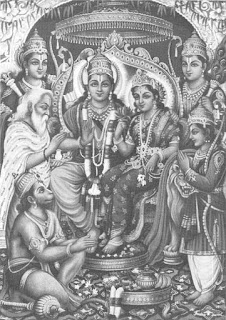‘Ramayana Masam’ :
Welcome to ‘Ramayana Masam’ :
In Kerala, the Malayalam month of Karkidakam is observed as Ramayana masam. This year, the month commences on 17th of July. Ramayana, the first adi kavyam (poem) of Hindus is recited during the whole month. Ramayana recitation during this time is considered a propitious practice.
As you are reading this, most Malayalees would be visualising images of nilavilakku, valkannadi, thulasi kathir, kindi….. I know you feel nostalgic when you hear about traditions followed in Kerala. However, with a big heart and devotional mind, you too can observe in a little way, these traditions passed on over the years.
Fortunately we have a translation into Malayalam by Thunchath :
Ramanujan Acharyan (Ezhuthachan).Reading Ramayana is considered to be very holy and divine. Association with such holy scriptures creates a divine aura. It also provides us with mental solace. People read Ramayana to build self-confidence during difficult times.
Ramayana is a depiction of the ups and downs in the life of various characters, teaching us lessons in moral values. Ramayana means “ the ayana (march) of Rama in search of human values”.
We should embrace the positive and negative sides of life.
Most of us possess Dasharatha-like traits . We celebrate life when everything goes smoothly, but are unable to face adversity and get into a downward spiral.
Rama represents the mind. The mind is continually remoulding itself in response to its social interactions. We should associate with good-hearted and positive people. When we constantly communicate with such people, our mind gets diverted away from negative thought patterns and our untapped potential will unfold and be nurtured. Most people suffer because they lack association with good people (satsang). Kaikeyi’s association with Manthara magnified the severity and gravity of the problem.
Human mind is made up of emotions. Our birth is a product of emotions between mother and father. Along with mother’s milk, we are also fed with emotions. As we grow up , the environment, family, society….. all contribute to our emotional makeup. In short, we grow in emotions. Emotions are very important in one’s life. But the most important thing is how to manage the emotions in our life. When our emotions become more mature, we gain a greater serenity within ourselves.
We seldom realise that there are all kinds of emotions in our mind. A single emotion arising from an inappropriate thought could result in unpleasant consequences. Sita was enchanted with the golden deer and panicked when Maricha cried out in imitation of Rama’s voice. Her misjudgement of the situation coupled with not heeding to Lakshmana’s advice had very severe repercussions. Eventually she became a victim of Ravana.
Our minds are highly susceptible to the influence of our companions. When we associate with good people, we get a spark of positive emotions which help us deal with the problems that are a normal part of life. Ramayana is a masterpiece on family relationships. It teaches us that we are in charge of the relationships we create. We have to make the right choices. Nothing will come by itself. Open the doors to opportunities for satsang. Satsangs become a platform for nurturing and cultivating positive relationships.
Rama’s association with Sage Agastya proved to be very crucial in his battle against Ravana. At the appropriate time, Sage Agastya taught Rama a hymn ( Adityahridayam) for worshipping Aditya , the Sun God for strength to defeat the enemy. This mantra helped Rama defeat Ravana and his forces. We all have to confront Ravana-like problems. These hurdles can assume gigantic forms, but when we get guidance from good associations, the uplifted mind can convert the gravity of any problem into a small challenge.
So I honestly and earnestly request you to use this Ramayana masam for developing good thoughts and good companions. Let us walk together in this path of life with a smile and holding each other’s hands.
Swami Udit Chaitanya





Comments
Post a Comment